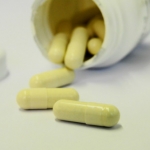During the two weeks prior to the onset of a menstrual period, many women experience physical symptoms, such as bloating, breast tenderness, headache, and muscle aches. A small proportion of women also note a change in their mood and complain of irritability, mood swings, depressed mood, or feeling tense. If these symptoms interfere with a woman’s ability to function, she may have premenstrual dysphoric disorder (PMDD).
Selective serotonin reuptake inhibitors (SSRIs), including Prozac, Zoloft, and Paxil, are antidepressants that effectively treat the symptoms of PMDD. Not every women needs to take an SSRI to treat her symptoms. Women with milder premenstrual symptoms may benefit from other strategies: avoiding alcohol and caffeine, aerobic exercise, and eating a diet high in complex carbohydrates. Non-steroidal anti-inflammatory agents (Motrin) can be helpful for relieving some of the uncomfortable physical symptoms. It has also been shown that calcium (600 mg twice a day) may improve mood and relieve physical discomfort. In cases where premenstrual symptoms are severe or do not respond to these strategies, an SSRI may be a good treatment option.
Ruta M. Nonacs, MD PhD
Pearlstein T. Steiner M. Non-antidepressant treatment of premenstrual syndrome. Journal of Clinical Psychiatry. 61 Suppl 12:22-7, 2000.







Leave A Comment